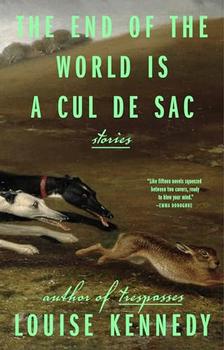Summary | Excerpt | Reviews | Beyond the Book | Read-Alikes | Genres & Themes | Author Bio

Stories
by Louise KennedyThis article relates to The End of the World Is a Cul de Sac
 In 2018, in a culturally and historically significant move, the Irish public voted in favor of overturning the country's long-held ban on abortion, with more than 66% supporting the repeal. This victory for improving access to healthcare for millions was by no means an overnight success, however.
In 2018, in a culturally and historically significant move, the Irish public voted in favor of overturning the country's long-held ban on abortion, with more than 66% supporting the repeal. This victory for improving access to healthcare for millions was by no means an overnight success, however.
On the contrary, the fight to legalize abortion in Ireland was a long and arduous one. The procedure was first criminalized in 1861 with the Offences Against the Person Act, which forbid women from seeking to "procure a miscarriage." This law would see a sentence of life imprisonment handed to anyone who had or provided an abortion, or helped to provide access to one in any way.
In 1983, the Eighth Amendment of the Constitution of Ireland came into effect. It protected "the right to life of the unborn." This effectively banned abortion under any circumstances, even when there was a direct threat to life for either the expectant mother or the unborn fetus.
Even now, following the removal of the Eighth Amendment, access to abortion is still somewhat restricted in comparison to many other countries. Aside from extreme circumstances, abortion in Ireland is only legal up to 12 weeks of pregnancy (compared to 24 weeks in the United Kingdom, for example), with at least a three-day waiting period required upon request for one. Access is not equal, having been described as something of a "postcode lottery." Rural communities in particular are experiencing a lack of care, with nine out of 26 counties having fewer than five general practitioners registered to provide abortion services. These gaps in access are believed to disproportionately impact marginalized groups, with people who are homeless, disabled, or dealing with domestic abuse having been acknowledged as particularly at risk.
Another important factor to consider when analyzing the success of Ireland's legalization of abortion is lingering stigma. Not only is this a huge issue socially, research from the University of Limerick found evidence that women dealing with stigma post-abortion experience associated psychological and physical health problems. A separate survey found that medical professionals providing abortion services also continue to face stigma, despite their work being protected by law and the sense of pride they feel in being able to provide healthcare that for so long was inaccessible.
Stigma and internalized shame following an abortion is explored in "Garland Sunday," one of fifteen stories painting pictures of Irish life in Louise Kennedy's The End of the World Is a Cul de Sac. This story, like the aforementioned research, highlights that while undeniable progress has been made, there is still some way to go in making sure everyone who wants or needs an abortion in Ireland can access it without fear of judgment or repercussion.
Crowd at Dublin Castle after Eighth Amendment referendum results on May 26, 2018
Photo by Katenolan1979 (CC BY-SA 4.0)
Filed under Society and Politics
![]() This "beyond the book article" relates to The End of the World Is a Cul de Sac. It originally ran in January 2024 and has been updated for the
December 2024 paperback edition.
Go to magazine.
This "beyond the book article" relates to The End of the World Is a Cul de Sac. It originally ran in January 2024 and has been updated for the
December 2024 paperback edition.
Go to magazine.
Your guide toexceptional books
BookBrowse seeks out and recommends the best in contemporary fiction and nonfiction—books that not only engage and entertain but also deepen our understanding of ourselves and the world around us.